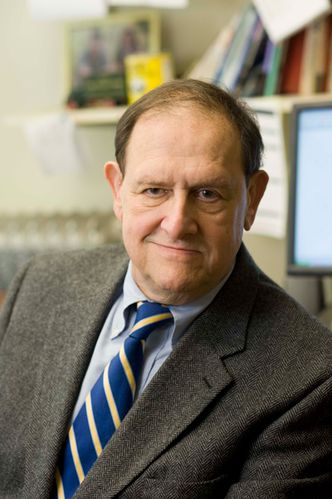COM’s Jonathan Klarfeld Remembered as Tough but Kind
Journalist taught decades of undergrad and grad students

Students say Jonathan Klarfeld considered his classroom their first newsroom and himself their first city editor. Behind his seemingly gruff demeanor, the longtime College of Communication associate professor of journalism cared deeply about his students, they say. Klarfeld, 80, died January 8 after a monthlong hospitalization.
“I read over the past week that he was old-school, and I don’t agree with that,” says former student Raphaelle Steg (COM’15), who now works at the French sports website BeSport. “He would teach us the old-school basis of journalism, but he was really open-minded about what we could do and all the differences we would bring to the table.”
Klarfeld taught reporting and writing courses and culinary journalism for more than 40 years at COM. He was at one point chair of journalism and oversaw undergraduate and graduate-level professional internships for the department. “Part of my job is observing faculty while they teach, and I remember telling him that his curmudgeon act really worked,” says William McKeen, a COM professor and chair of journalism and associate dean. “He amped it up in the classroom, but that’s the teacher that young journalists respond to.”
McKeen says that when he started at BU in 2010, he and Klarfeld settled into a routine. Klarfeld would stop by McKeen’s office every day, sit on the couch, and discuss the morning’s news. “He would ask me if I saw this item on page B12 in which they commit a heinous crime against language,” McKeen remembers. “He was a great colleague.”
Before coming to BU, Klarfeld was a bureau chief at UPI and an assistant city editor at the Boston Globe. He also worked in various positions at the Holyoke Transcript-Telegram, the Boston Record-American, the Boston Herald, and the Boston Phoenix. His freelance work appeared in the Sunday Times of London, Saveur magazine, Boston magazine, Oceans magazine, and the Boston Review of the Arts, among others. He was for a brief time a political press secretary, testified as an expert witness in court cases concerning First Amendment rights and journalistic standards, and was an editorial consultant and writing coach.
When news of his death was announced on the journalism department’s Facebook page, more than two dozen former students and colleagues left comments. In an obituary in the Boston Globe, he was remembered fondly by several of his students, who now work at respected news agencies and publications like the Associated Press and National Geographic.
Journalism department administrator Sarah Kess (COM’12), who worked with Klarfeld for two years, says he always stopped by to check in. “He was a little crotchety and grumpy, but endearing,” she says. “He was always so incredibly kind to me. He would ask how I was, and it wasn’t a formality, because he really wanted to know.” Kess laughs remembering that Klarfeld was obsessed about catching a cold and would ask her to order bottles of hand sanitizer for him. She says she still washes her hands diligently because of his advice.
WBUR’s Morning Edition newswriter Ally Jarmanning (COM’08) was a student in Klarfeld’s fundamentals of journalism class. Now a COM adjunct professor, she uses a class exercise she learned from Klarfeld: “I’ll pretend to be the police chief and tell the students there’s been a murder,” she says. “They have to ask me questions and write their own breaking news story in 20 or 30 minutes. At first they think they can’t do it in that short a time, but that’s how you learn to be a reporter and work on deadline.”
Jarmanning stayed in touch with Klarfeld after graduation and the two would go out for sushi lunches. The other day she was looking back at old emails and reminiscing. “I saw how much I relied on him as a friend and for career advice,” she says.
Former student Steg is from France and enjoys rugby, and Klarfeld relished talking to her about both. “He would talk to me for hours about his rugby experience in Ireland and how he started a team on Beacon Hill,” she says. “He would also often start speaking French, but his accent was…not great, and I had to nod and agree, because I couldn’t understand much.”
Journalist Delia Cabe (CAS’82, COM’92), who teaches at Emerson College, says Klarfeld taught her how to write quickly and how to think on her feet. “He had a lot of energy and passion,” she says. “He ran a tight ship, and he always reminded us that we were writing about people’s lives.”
Zach Halperin (COM’16) remembers feeling intimidated because he was the only undergraduate in Klarfeld’s columns and editorials class. “We had to write a 700-word column every week and read it in front of the class,” Halperin says. “He just encouraged me to be myself and find my writer’s voice. He always made fun of me and gave me shit, but it was a funny relationship. We always talked after the class, emailed back and forth, talked about what I wanted to do going forward. He was a great professor, and he made me a better writer.”
Klarfeld is survived by his wife, Patricia, his daughter and son-in-law, Victoria Capehart (COM’10) and John B. Capehart, and his son, Alexander. A private family memorial has been held.
Comments & Discussion
Boston University moderates comments to facilitate an informed, substantive, civil conversation. Abusive, profane, self-promotional, misleading, incoherent or off-topic comments will be rejected. Moderators are staffed during regular business hours (EST) and can only accept comments written in English. Statistics or facts must include a citation or a link to the citation.